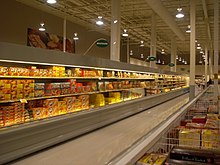
Back تجميد الطعام Arabic Замразена храна Bulgarian Congelació d'aliments Catalan Tiefkühlkost German Frostigita manĝaĵo EO Congelación de alimentos Spanish Külmutatud toit ET غذای منجمد FA Pakastus Finnish Congélation French


Freezing food preserves it from the time it is prepared to the time it is eaten. Since early times[when?], farmers, fishermen, and trappers have preserved grains and produce in unheated buildings during the winter season.[1] Freezing food slows decomposition by turning residual moisture into ice, inhibiting the growth of most bacterial species. In the food commodity industry, there are two processes: mechanical and cryogenic (or flash freezing). The freezing kinetics is important to preserve the food quality and texture. Quicker freezing generates smaller ice crystals and maintains cellular structure. Cryogenic freezing is the quickest freezing technology available due to the ultra low liquid nitrogen temperature −196 °C (−320 °F).[2]
Preserving food in domestic kitchens during modern times is achieved using household freezers. Accepted advice to householders was to freeze food on the day of purchase. An initiative by a supermarket group in 2012 (backed by the UK's Waste & Resources Action Programme) promotes the freezing of food "as soon as possible up to the product's 'use by' date". The Food Standards Agency was reported as supporting the change, provided the food had been stored correctly up to that time.[3]
- ^ Tressler, Evers. The Freezing Preservation of Foods pp. 213-217
- ^ Sun, Da-Wen (2001). Advances in food refrigeration. Leatherhead Food Research Association Publishing. p.318. (Cryogenic refrigeration)
- ^ Smithers, Rebecca (10 February 2012). "Sainsbury's changes food freezing advice in bid to cut food waste". The Guardian. Retrieved 10 February 2012.
Long-standing advice to consumers to freeze food on the day of purchase is to be changed by a leading supermarket chain, as part of a national initiative to further reduce food waste. [...] instead advise customers to freeze food as soon as possible up to the product's 'use by' date. The initiative is backed by the government's waste advisory body, the Waste and Resources Action Programme (Wrap) [...] Bob Martin, food safety expert at the Food Standards Agency, said: "Freezing after the day of purchase shouldn't pose a food safety risk as long as food has been stored in accordance with any instructions provided. [...]"